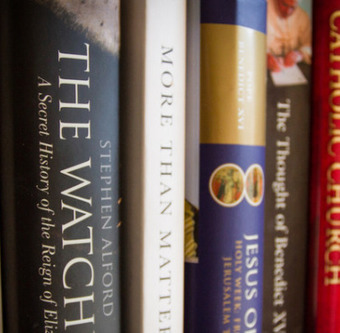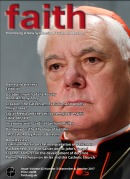
Book Review
The unrelenting foe of Nazism
Catholics Confronting Hitler - The Catholic Church and the Nazis by Peter Bartley, Ignatius Press, 291 pp, £14.34.
reviewed by Pravin Thevathasan
In much of the secular media, the Catholic Church is said to have remained silent in the face of Nazi atrocities. Not so, says Bartley in this well-researched work. And the resistance began with the condemnation of the race laws in pre-war Germany and only ended with the demise of Nazi Germany. Those many Catholics who protected the Jews - bishops, clergy and laity alike - did so knowing full well that they were putting their own lives at risk.
Bartley documents the repeated condemnations of the Nazi euthanasia programmes and antisemitism by the German bishops. Blessed Clemens Von Galen was the Bishop of Munster who led Catholic protests against the Nazi euthanasia programmes and who courageously condemned Gestapo lawlessness, the Nazi persecution of the Church and the Nazi worship of race. Cardinal Michael Von Faulhaber, the Archbishop of Munich, was jeeringly referred to as “the Jewish Cardinal” by the Nazis because of his consistent condemnation of antisemitism. When the Nazis claimed that the pre-Christian German tribes were of a superior race, Faulhaber responed: “It is an historic fact that this swarm of tribes were first wielded together into stable unity as one nation in consequence of their conversion to Christianity ... the greatest perversion would be a relapse into the paganism of ancient Germany.” Mention is also made of Sophie Schall, a Lutheran anti-Nazi political activist who was executed by the Nazis at the age of twenty-one.
Of the Croatian Cardinal Aloysius Stepinac’s condemnation of the Ustashe regime, Bartley writes: “Official German reports testify to Stepinac’s intercession on behalf of both Serbs and Jews, which by May 1943 he had made on thirty-four occasions.”
Rescue operations
In Rome, Archbishop Montini “directed the Vatican rescue operations from inside the Vatican, with the roving assistance of an indefatigable Irishman, Monsignor O’Flaherty.” All the safe places in Rome were known to O’Flaherty and “he and his associates have been credited with saving more than six thousand Jews and political refugees from the clutches of the Gestapo.” The Pontifical Relief Commission distributed food and clothing to displaced and hungry people, saving countless lives. It was created by Pope Pius XII.
In France, it was the underground papers written by French Jesuits that exposed Nazi racism. The pope knew of this and approved. The majority of France’s Jews that survived the war had received direct help from Catholics.
Papal nuncios in Slovakia, Hungary and elsewhere condemned the Nazi arrest of the Jews and they got their orders from the pope. The future St John XXIII saved the lives of thousands of Jews by issuing them with baptismal certificates while he was apostolic delegate to Turkey and Greece.
Nazi retaliation
Bartley documents the Nazi response to the statement condemning Nazism by the Dutch bishops read out in all the churches of the nation on July 1942. The Nazis retaliated by arresting all Jews who were baptized Catholics. They were deported east from Westerbork transit camp to Auschwitz. Among them was Edith Stein who like the others deported died in Auschwitz. How much greater would the Nazi retaliation been had such a direct condemnation come from the pope?
Some of the Christian heroes appear more heroic than Christian: Oskar Schindler was a German Catholic businessman of “somewhat shady business dealings” whose Cracow factory became an asylum for Jews. As the war drew to a close, he effected the removal of more than a thousand Jews, the so-called ‘Schindler’s List’, to Moravia and safety.
The Swedish diplomat Raoul Wallenberg, also mentioned by Bartley, saved tens of thousands of Jews in Nazi occupied Hungary from the Holocaust by sheltering them in buildings designated as Swedish territory and by issuing them with protective passports.
Hitler’s Pope?
Even those who condemn Pope Pius XII for his alleged silence over Nazi atrocities increasingly accept that he was not “Hitler’s Pope.” But did he keep silent? Bartley has amassed a wealth of evidence to demonstrate that the pope did not keep silent. He spoke out against Nazi atrocities on many occasions and most notably in his Christmas message of 1942. Even though the Nazis were not mentioned by name, they certainly knew that the attack was aimed at them and they reacted with fury.
What, then, of the Reich Concordat of 1933? Bartley writes that although Cardinal Pacelli had few illusions about Hitler, he hoped that at least some of the provisions of the concordat would be honoured. He was proved right: pulpit denunciations of Nazism went generally unpunished and churches were allowed to remain open throughout Hitler’s rule. A prudential decision had been made on behalf of the German Catholics. However, they did not regard the concordat as in any way approving of Nazism: resistance to Hitler was at its highest in the Catholic parts of Germany.
Bartley writes: “Pius XII made no distinction between the respective ideologies and practices of Communism and Nazism.Both were Godless, and both persecuted religion. He thought Hitler more to be feared than Stalin but that Communist Russia presented the greater long-term threat to religion ... the pope did not share Roosevelt’s sanguine opinion regarding the future of religion in Soviet Russia.” The myth of “Hitler’s Pope” is surely being laid to rest.
Bartley has had access to the relevant public diaries, letters, Church documents and works by other scholars. He concludes that “two reigning popes and three future popes in significant ways offered resistance to Hitler ... wherever Nazism held sway, it found an unrelenting foe in the pope and the Catholic Church.” In this fine work, he has given us plenty of evidence to prove this.
Notes:
Dr Pravin Thevathasan is a consultant psychiatrist. He is editor of the Catholic Medical Quarterly.

